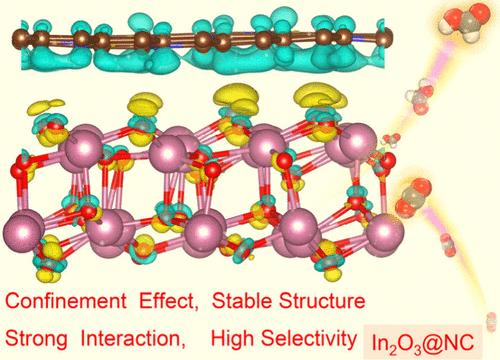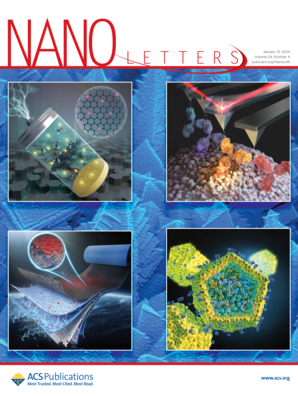Confinement-Stabilized High-Valent Indium for pH-Universal Electrocatalytic CO2 Reduction
IF 9.1
1区 材料科学
Q1 CHEMISTRY, MULTIDISCIPLINARY
引用次数: 0
Abstract
The integration of electrocatalytic carbon dioxide reduction (CO2) with biomass valorization for the production of high-value chemicals presents a promising strategy for achieving carbon neutrality. Herein, we synthesized a nitrogen–carbon layer (NC layer) confined indium oxide (In2O3) to enhance the electrochemical CO2 reduction activity, concurrently coupling with the anodic formaldehyde oxidation reaction to achieve simultaneous electrosynthesis of formate in both cathode and anode compartments. Confinement within the NC layer significantly improves the formate selectivity of In2O3 while maintaining a high catalytic stability across a wide pH range. Density functional theory (DFT) calculations reveal that the work function difference between the NC layer and the In2O3 induces strong electronic interactions and stabilizes the Inδ+ species under catalytic conditions. This work presents an approach for efficient formate electrosynthesis through the simultaneous modulation of catalyst interfacial structure and coupling reactions.

ph -通用电催化CO2还原用稳定高价铟
将电催化二氧化碳还原(CO2)与高价值化学品生产的生物质增值相结合,是实现碳中和的一种有前途的策略。在此,我们合成了一种氮碳层(NC层)约束的氧化铟(In2O3),以提高电化学CO2还原活性,并与阳极甲醛氧化反应同时耦合,在阴极和阳极室中同时电合成甲酸盐。在NC层内的限制显著提高了In2O3的甲酸选择性,同时在很宽的pH范围内保持了很高的催化稳定性。密度泛函理论(DFT)计算表明,NC层与In2O3之间的功函数差异引起了强的电子相互作用,并在催化条件下稳定了Inδ+。这项工作提出了一种通过同时调制催化剂界面结构和偶联反应来高效合成甲酸酯的方法。
本文章由计算机程序翻译,如有差异,请以英文原文为准。
求助全文
约1分钟内获得全文
求助全文
来源期刊

Nano Letters
工程技术-材料科学:综合
CiteScore
16.80
自引率
2.80%
发文量
1182
审稿时长
1.4 months
期刊介绍:
Nano Letters serves as a dynamic platform for promptly disseminating original results in fundamental, applied, and emerging research across all facets of nanoscience and nanotechnology. A pivotal criterion for inclusion within Nano Letters is the convergence of at least two different areas or disciplines, ensuring a rich interdisciplinary scope. The journal is dedicated to fostering exploration in diverse areas, including:
- Experimental and theoretical findings on physical, chemical, and biological phenomena at the nanoscale
- Synthesis, characterization, and processing of organic, inorganic, polymer, and hybrid nanomaterials through physical, chemical, and biological methodologies
- Modeling and simulation of synthetic, assembly, and interaction processes
- Realization of integrated nanostructures and nano-engineered devices exhibiting advanced performance
- Applications of nanoscale materials in living and environmental systems
Nano Letters is committed to advancing and showcasing groundbreaking research that intersects various domains, fostering innovation and collaboration in the ever-evolving field of nanoscience and nanotechnology.
 求助内容:
求助内容: 应助结果提醒方式:
应助结果提醒方式:


